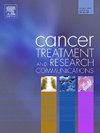绘制保加利亚乳腺癌护理的景观:范围审查
IF 2.4
Q3 Medicine
引用次数: 0
摘要
乳腺癌是世界上最常见的癌症类型之一,在保加利亚,乳腺癌占女性所有恶性诊断的四分之一。保加利亚的乳腺癌筛查在所有欧洲联盟国家中是最低的。关于保加利亚乳腺癌护理的现有文献很少。这项研究的目的是探讨目前的趋势,模式和差距在保加利亚乳腺癌护理。方法本研究是对同行评议数据库和灰色文献的范围综述。根据SPIDER方法的纳入和排除标准对结果进行筛选。采用covience进行筛选和全文综述。该研究包括39个来源。结果乳腺癌是保加利亚癌症死亡的主要原因,由于漏报,发病率仍低于欧洲平均水平。保加利亚缺乏结构化的乳腺癌筛查方案,导致服务使用率低,尽管必要的预防性检查由国家健康保险基金支付。诸如治疗使用不足和新癌症疗法的报销严重延迟等障碍仍然存在。与欧盟其他国家相比,存活率较低。虽然政策侧重于增加筛查和改善预防,但尚未采取实现这一目标的实际步骤。结论保加利亚乳腺癌筛查率低,漏报率低。缺乏诊断方法的全额报销、多学科方法的有限采用以及复杂的市场准入程序是制定有效治疗计划的障碍。有效的筛查和预防对取得积极成果至关重要。本文章由计算机程序翻译,如有差异,请以英文原文为准。
Mapping the landscape of breast cancer care in Bulgaria: a scoping review
Background
Breast cancer ranks as one of the most common cancer types in the world, and in Bulgaria, it represents a quarter of all malignant diagnoses in women. Breast cancer screening in Bulgaria is the lowest among all European Union (EU) countries. Existing literature on breast cancer care in Bulgaria is scarce. This study aims to explore the current trends, patterns, and gaps in breast cancer care in Bulgaria.
Methods
This study is a scoping review from peer-reviewed databases and grey literature. The results were screened against the SPIDER methodology's inclusion and exclusion criteria. Covidence was used in screening and full-text review. The study included 39 sources.
Results
Breast cancer is the leading cause of cancer mortality in Bulgaria and the incidence remains lower than the European average due to underreporting. Bulgaria lacks a structured breast cancer screening programme, leading to low service use, although essential prophylactic exams are covered by the National Health Insurance Fund. Barriers like the underuse of treatment and significant delays in reimbursement of new cancer therapies exist. with lower survival rates compared to the rest of the EU. While policies focus on increasing screening and improving prevention, practical steps towards achieving this have not yet been taken.
Conclusion
There is low screening and underreporting of breast cancer rates in Bulgaria. The lack of full reimbursement of diagnostic methods, limited adoption of the multidisciplinary approach, and complex market access processes are barriers to developing efficient treatment plans. Efficient screening and prevention are crucial for positive outcomes.
求助全文
通过发布文献求助,成功后即可免费获取论文全文。
去求助
来源期刊

Cancer treatment and research communications
Medicine-Oncology
CiteScore
4.30
自引率
0.00%
发文量
148
审稿时长
56 days
期刊介绍:
Cancer Treatment and Research Communications is an international peer-reviewed publication dedicated to providing comprehensive basic, translational, and clinical oncology research. The journal is devoted to articles on detection, diagnosis, prevention, policy, and treatment of cancer and provides a global forum for the nurturing and development of future generations of oncology scientists. Cancer Treatment and Research Communications publishes comprehensive reviews and original studies describing various aspects of basic through clinical research of all tumor types. The journal also accepts clinical studies in oncology, with an emphasis on prospective early phase clinical trials. Specific areas of interest include basic, translational, and clinical research and mechanistic approaches; cancer biology; molecular carcinogenesis; genetics and genomics; stem cell and developmental biology; immunology; molecular and cellular oncology; systems biology; drug sensitivity and resistance; gene and antisense therapy; pathology, markers, and prognostic indicators; chemoprevention strategies; multimodality therapy; cancer policy; and integration of various approaches. Our mission is to be the premier source of relevant information through promoting excellence in research and facilitating the timely translation of that science to health care and clinical practice.
 求助内容:
求助内容: 应助结果提醒方式:
应助结果提醒方式:


